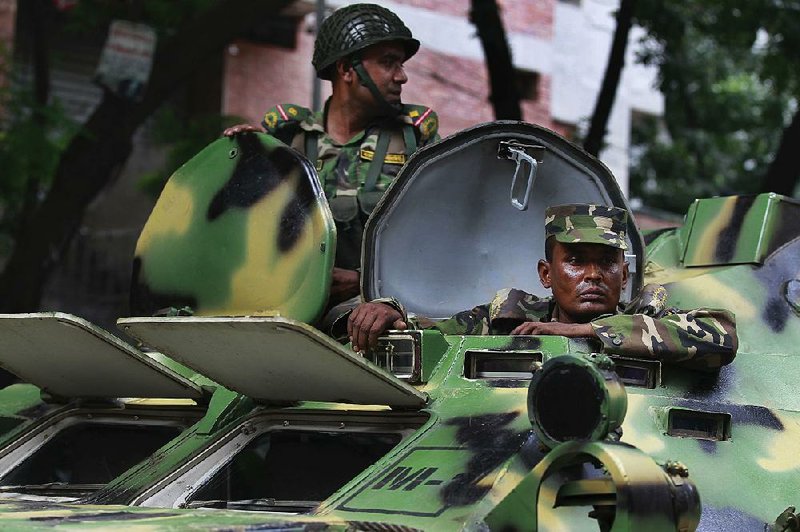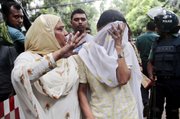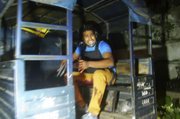DHAKA, Bangladesh -- Bangladeshi forces stormed an upscale Dhaka restaurant early Saturday to end a hostage-taking by heavily armed militants, killing six of the attackers and rescuing 13 captives. The military said 20 captives, mostly foreigners, were killed during the 10-hour standoff, and a survivor's father said the attackers spared people who could recite verses from the Koran.
The overnight crisis and the commando raid in Bangladesh's diplomatic zone left at least 28 dead, including the attackers, who had been holding captives in the restaurant while hurling bombs and engaging in a gunbattle with security forces. Two Bangladeshi police officers also were killed.
The slain captives included nine Italians, seven Japanese, three Bangladeshis and one Indian, government sources said, as details of the bloodshed began trickling from other capitals worldwide. The White House confirmed Saturday that a U.S. citizen was among the captives killed, but did not release any further identification.
The discrepancy between the number of hostages reported dead by the military and the tally of the confirmed dead by nationality when including the U.S. citizen could not immediately be reconciled.
Paramilitary troops who mounted the rescue operation, which took 12-13 minutes, killed the attackers and collected explosive devices and sharp weapons from the scene, Brig. Gen. Nayeem Ashfaq Chowdhury said.
Dhaka was locked down Saturday, with checkpoints every few blocks stopping cars and pedestrians.
The attack marks an escalation in militant violence that has hit the traditionally moderate Muslim-majority nation with increasing frequency in recent months, with the extremists demanding the secular government revert to Islamic rule. Most previous attacks have involved machete-wielding men singling out activists, foreigners and religious minorities.
But Friday night's attack was different, more coordinated, with the attackers brandishing assault-style rifles as they shouted "Allahu akbar," or "God is great," and stormed the Holey Artisan Bakery in Dhaka's Gulshan area while dozens of foreigners and Bangladeshis were dining out during the Ramadan holy month.
The gunmen, initially firing blanks, ordered restaurant workers to switch off the lights, and they draped black cloths over closed-circuit cameras, according to a survivor, who spoke with Bangladeshi TV channel ATN News. He and others, including kitchen workers, escaped by running to the rooftop or out the back door.
But about 35 were trapped inside, their fate depending on whether they could prove themselves to be Muslims, according to the father of a Bangladeshi businessman who was rescued Saturday morning along with his family.
"The gunmen asked everyone inside to recite from the Koran," the Islamic holy book, according to Rezaul Karim, describing what his son, Hasnat, had witnessed inside. "Those who recited were spared. The gunmen even gave them meals last night."
The others, he said, "were tortured."
Detectives were questioning his son and his family along with other survivors Saturday as part of the investigation, as scattered details of the siege emerged. Authorities also were interrogating one of the attackers captured by commandos in the morning operation.
It was not immediately clear whether the attackers had a specific goal, and Bangladesh authorities would not say if they had made any demands.
The Islamic State militant group claimed responsibility, saying it targeted the citizens of "Crusader countries" in the attack, warning that citizens of such countries would not be safe "as long as their warplanes kill Muslims." The statement was circulated Friday by Islamic State supporters on the Telegram messaging service and resembled previous statements by the Islamic State.
It was not immediately clear if the group's leadership in Syria and Iraq was involved in planning the attack. The Amaq news agency, affiliated with the Islamic State, also posted photos purportedly showing hostages' bodies, though the authenticity of the images could not be confirmed.
The government did not directly comment on the Islamic State claim but has denied in the past that the extremist group has a presence in Bangladesh. The government of Prime Minister Sheikh Hasina instead has accused her political enemies of orchestrating the violence to destabilize the nation -- which the opposition denies.
On Saturday, Amaq published photos of five smiling men, each holding what appear to be an assault-style rifle and posing in front of a black Islamic State flag. The news outlet identified the five as the attackers, according to the SITE Intelligence Service, which monitors jihadi online activity. They were identified by names indicating they were all Bangladeshis. Amaq said the fighters used "knives, cleavers, assault rifles and hand grenades."
Amaq said the attackers "verified" the identities of the captives, sparing the Muslims and killing the foreigners.
"All the hostages were killed last night. The terrorists used sharp weapons to kill them brutally," Chowdhury, the army general, said at a news conference Saturday night.
Two Bangladeshi police officers also died from injuries suffered while exchanging gunfire with the attackers Friday night.
Italian President Sergio Mattarella cut short a visit to Latin America because of the massacre, the Italian news agency ANSA reported. Italy's soccer players wore black armbands in a sign of mourning during Saturday's European Championship quarterfinals match against Germany.
A Roman Catholic priest in southern Italy, whose sister, Simona Monti, 33, a textile company employee, was killed in the attack expressed hope that her death could contribute toward making a more just world. The Rev. Luca Monti said he hopes "this experience of martyrdom for my family and the blood of my sister Simona can help contribute to building a more just and brotherly world."
In New Delhi, Foreign Minister Sushma Swaraj said she was "extremely pained to share that the terrorists have killed Tarushi, an Indian girl who was taken hostage in the terror attack in Dhaka."
Tarushi Jain, 18, had been on holiday from her studies at the University of California, Berkeley. She was in Dhaka visiting her father, who has run a garment business in the country for the past 15 or 20 years, according to Indian government sources, who were not authorized to speak with the media and so requested anonymity.
Jain had been working on e-commerce growth at Eastern Bank Limited in Dhaka through an internship with a university center for Bangladeshi studies, which began in early June, university officials said.
Another Indian citizen, a doctor who spoke Bengali and could pass himself as a Bangladeshi, was released unharmed, a government source said.
A Bangladeshi woman, Ishrat Akhond, was among the dead. She had been holding a dinner meeting with Italian businessmen when she was killed in the siege, according to three of her friends who did want to be named for fear of reprisal.
Emory University in Atlanta said in a statement from President James Wagner that two of its students were killed in the attack: Abinta Kabir of Miami, a sophomore at the school's Oxford, Ga., campus who was visiting family members and friends in Bangladesh, and Faraaz Hossain of Dhaka, a junior at the university's Goizueta Business School.
Ten of the 26 people wounded Friday night when the militants opened fire were in critical condition, and six were on life support, according to a hospital where they were treated. The injuries ranged from broken bones to gunshot wounds. Most of them were police officers, but one was a civilian. The hospital refused to provide any details of their conditions Saturday.
Two foreign chefs working in the kitchen, Argentine Diego Rossini and Italian Jacopo Bioni, described to journalists in their countries how they escaped during the initial attack by rushing to the rooftop terrace and then jumping two stories down onto a nearby building as the attackers chased them, firing weapons and hurling grenades.
"They were very well-prepared with bombs, guns, machine guns -- it was horrible," Rossini said in an interview with Argentine TV newscast C5N.
Another Italian, businessman Gianni Boschetti, was dining with his wife but had just stepped into the restaurant garden to take a phone call when the attack began. Italian state TV said Boschetti threw himself into some bushes and escaped. His sister-in-law, Patrizia D'Antona, told Italian state TV that he "wandered all night" from hospital to hospital in hopes of finding his wife, Claudia Maria D'Antona, 56. She was later identified as among the nine Italians found slain in the restaurant.
Eight outside consultants for Japan's development agency were eating together at Holey Artisan Bakery when the attack began. One was among captives rescued by security forces Saturday morning.
The Japanese were working on an infrastructure project for the Japan International Cooperation Agency. The president of the agency, Shinichi Kitaoka, said it would strengthen security precautions while continuing to contribute to the development of Bangladesh.
In the end, paramilitary troops rescued 13 captives, including one Argentine, two Sri Lankans and two Bangladeshis, according to Lt. Col. Tuhin Mohammad Masud, commander of the tactical unit that conducted the rescue operations.
The attack came during Ramadan, when devout Muslims fast during the day and eat after dark. Many left the city of more than 10 million people for a nine-day public holiday to celebrate the Eid al-Fitr festival that marks the end of Ramadan.
Hasina, the prime minister, announced two days of national mourning for the dead.
Information for this article was contributed by Katy Daigle, Nirmala George, Ken Moritsugu, Frances D'Emilio, Jonathan Landrum, Matthew Pennington and Ken Moritsugu of The Associated Press and by Emily Alpert Reyes, Brittny Mejia, David Zahniser of the Los Angeles Times.
A Section on 07/03/2016


